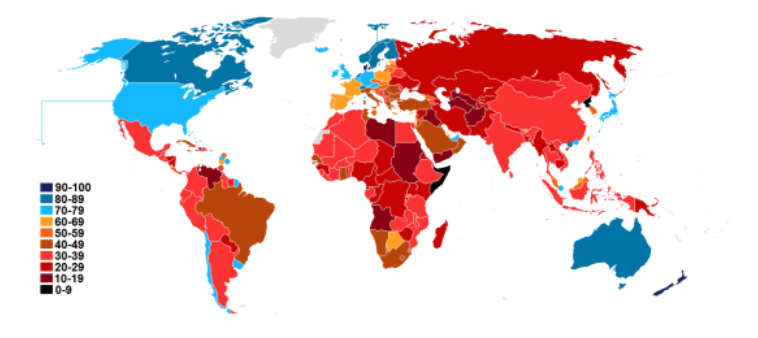Transparency International’s 2014 Corruption Perceptions Map. See 2015 interactive map here.
The opposition dominated National Assembly has been considering the Ley de Transparencia, Divulgación y Acceso a la Información Pública since early this year. In early March it was passed in first discussion. Allies suggest that it will be passed in second discussion in the coming months. Of course, the majority of laws passed by the National Assembly have been declared unconstitutional.
Activists suggest that a transparency law would force the State to permit access to information it currently withholds from the public under the pretext of it being politically sensitive, such as epidemiological data or homicide rates. It would also force transparency in ministerial and local government budgets. The law would include a council with sanctioning power over institutions that refuse to release information to the public.
If passed and not declared unconstitutional, the law would take effect in a dire context. The latest Corruption Perception Index (2015) for Venezuela from Transparency International ranks Venezuela at 158 of 168 countries surveyed last year. On reporting the survey the NGO says that the lowest-ranked countries in its index –including Venezuela –are characterized by “deficient governability, fragile public institutions, such as the police and the judicial power, and a lack of media independence.”
The AN has set up a Comptrollership Commission, presided by Voluntad Popular deputy Freddy Guevara, to look into what it says is the mismanagement (daño al patrimonio público) of $69 billion. The Socialist Party (PSUV) deputies abstained from voting for the establishment of the Commission claiming that corruption is widespread and that the Commission would “politicize” the issue. PSUV deputy Edwin Rojas claimed that an opposition run Commission would fail to see corruption as a “deviation coming from Capitalism.”
The cases the Commission says it will look into are related to state oil company (PDVSA), but also to the Instituto Venezolano de Seguro Social (IVSS), Misión Barrio Adentro, and Servicio Autónomo de Elaboraciones Farmaceúticas (SEFAR.) The Commission also says it is looking into the cases 88 public officials, including PDVSA’s ex-president and current Venezuelan ambassador to the UN Rafael Ramirez, and other officials, such as Rodolfo Marcos Torres, Iris Valera, José David Cabello, Carlos Osorio. Freddy Guevara has also said the Commission will propose a Proyecto de Ley de Recuperación de Activos de Venezuela to recover the lost funds.
For its part, the Maduro government announced an anti-corruption crack down in January this year when Interior Minister Gustavo González López, announced that the anti-bachaquero operation Operación Ataque al Gorgojo, had dismantled a band operating inside the state run Abastos Bicentenarios. In the following month he said that 49 personnel of the Abastos had been arrested for “food distribution corruption.” This included three high officials the media said had “close links” with the current Food Minister Carlos Osorio. González López blamed this case of corruption on “infiltrated elements that can only be called traitors.”
Critiques of the way the government has handled the corruption issue from within Chavismo has been increasingly common. In February 2016 for example, Roy Chaderton, Venezuela’s ex-ambassador to OAS and current chief of international affairs of the ruling party PSUV, publicly admitted that corruption was a real problem for Chavismo. Like other government officials he also blamed infiltrators and traitors for the situation.
However critiques from other important government officials have been stronger. In June 18, 2014, Chávez’s ex-minister Jorge Giordani published a public letter critiquing Maduro and expressing concern for corruption. When he and ex-minister Hector Navarro, ex-minister of education, called a press conference in December 2015 to denounce “bureaucratisim, nepotism, and corruption,” they were interrupted by pro-government militants. They have since then both been making claims about the corruption in the government. Giordani was called “a traitor” by Maduro, and Navarro has been suspended from the PSUV.
Hector Navarro, is the only public official who has made an appearance in the Comptroller Commission of the AN. In his presentation in April, he pointed out that the the 2011 anti-corruption proposal had been set aside and that when then-president Hugo Chávez asked him why, he responded that the main problem was a conflict of interests among friends.



